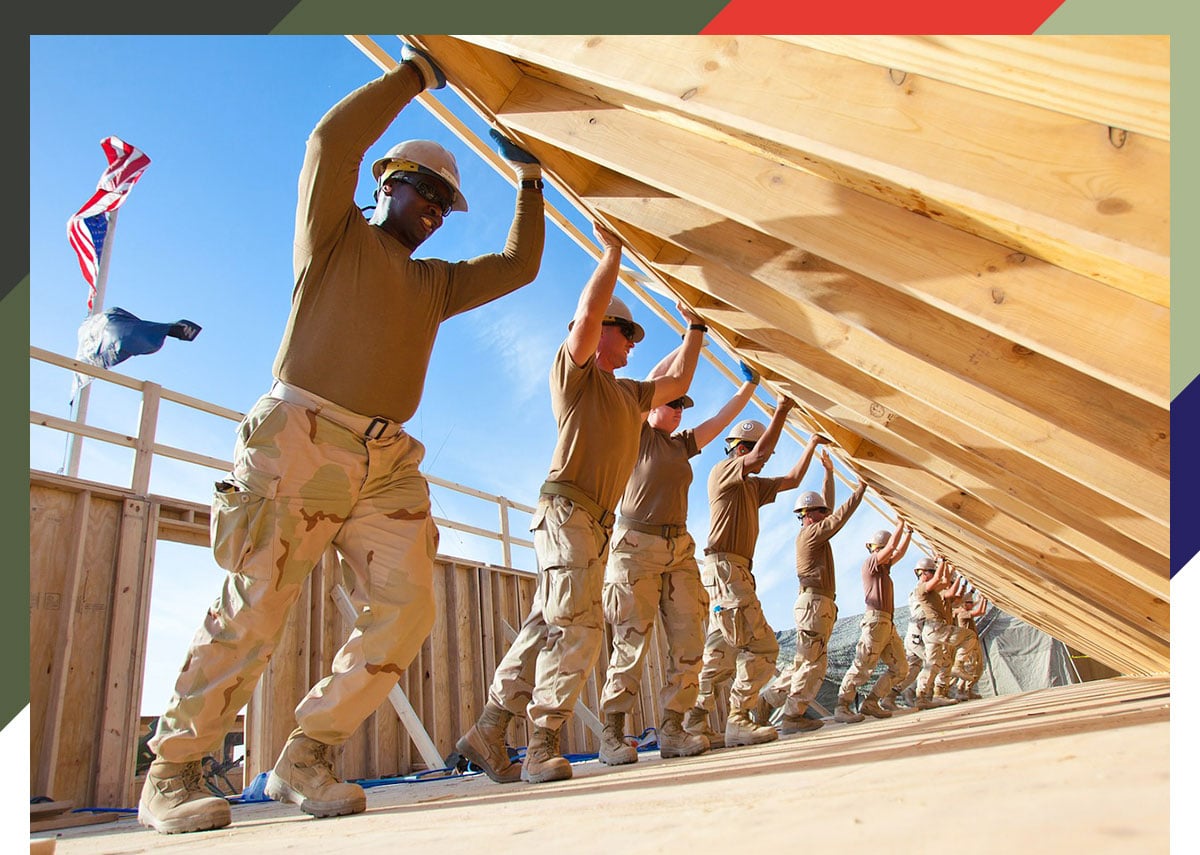My Hero Crate has made it our mission to improve the lives of veterans. Our method is to build military care packages for every branch of the armed forces and to ship them anywhere in the world, wherever your hero is living. We also support nonprofit, veteran-focused organizations because we put our money where our mouth is. We are not experts in mental health or military suicides. We aren’t trained psychiatrists with an in-depth knowledge of how the brain works. But we do care a whole lot. And that’s why this month, National Suicide Prevention Month, we wanted to share with you some of the research we found about helping military veterans access the care they need, should they ever experience suicidal ideation. If this blog post helps even one veteran and the people that care about them get through a difficult time, then writing it will have been worth it.
It is more than unfortunate that United States military veteran suicide has been a phenomenon for decades; the very first suicide prevention center opened in 1958 because of the prolific number of veteran suicides. In the years since, the U.S. and Veterans Affairs have taken steps to reduce rates of suicide by establishing additional mental health resources and legislation. It is difficult, however, to fix the root cause of the problem. According to a report published by the VA in 2016, an average of 20 veterans die from suicide each day. Further analysis of the VA study shows that the rate varies by age group. Sixty-nine percent of suicides involved veterans 50 and older, whereas 31 percent involved younger veterans. Ninety-seven percent of victims were male.
The National Center for Veterans Studies at the University of Utah and the VA both say there are risk factors that increase the likelihood of military veterans experiencing suicidal ideation:
It’s difficult to predict when someone may be considering suicide, especially if they tend to hide their emotions. However, there is a set of common warning signs you can watch for as you interact with your hero at home, over the phone, or via mail.
Don’t worry that if you ask your hero about suicidal thoughts or feelings, you push them into actually doing it. Giving them a chance to express their feelings can actually reduce their risk of acting on them. To do so, you can start your one-on-one conversation by asking some sensitive questions, like: You should also ask some direct questions, like: Your questions can continue to delve into more detail, like:
Most suicidologists agree that committing suicide isn’t a decision. In an essay by Gerben Meynen, a professor of forensic psychiatry at Utrecht University in the Netherlands, he argues that “having a mental disorder takes away a person’s ability to choose alternatives.” In fact, until the most recent edition of the Diagnostic and Statistical Manual of Mental Disorders (DSM), “loss of freedom” was listed as a component of mental illness. This description has now been updated to an “impairment in one or more important areas of functioning,” which is said to include “one or more losses of freedom.” It makes sense, then, that talking about suicide in a way that insinuates it is your hero’s choice would not be productive, and would instead shame them for their struggle. Never refer to committing suicide as selfish, stupid, cowardly or weak, a choice, or a sin, regardless of your personal beliefs.
If your hero is considering suicide, you can help them get the resources they need. You can encourage them to call the National Suicide Prevention Lifeline at 1-800-273-8255, and offer to sit with them as they make the call. To access responders with experience helping veterans, your hero should press “1” at the prompt. If they prefer to text with a responder at the Lifeline, they can send a message to 838255. Help them locate the phone number for their doctor at the VA to get access to the VA Mental Health program and VA Suicide Prevention program. There are so many non-profit organizations dedicated to veterans’ mental health — just like the ones we donate to with the proceeds from each of our military care packages. You can learn more about them at veteranscrisisline.net. Be supportive. Express your love for them, and your concern.
Your personal military hero is also ours. It is our sincere hope that you and your veteran will learn to stave off the thoughts of suicide while living your best possible lives together.
Ways You Can Help Your Hero in Need
A Long History of Veteran Suicide
The cause? It’s not precise, but the majority of veterans who commit suicide reportedly struggled with post-traumatic stress disorder (PTSD), depression, and combat-related guilt. Transitioning back to civilian life can also be quite difficult, especially after years in the military. Risk Factors for Veteran Suicide
Suicide Warning Signs to Watch For
How to Start the Conversation with Your Hero
What Not to Say
You should also avoid “making it about you.” It is likely your hero has already thought about the repercussions of suicide and how it may affect their loved ones, but still views it as the only escape from their feelings.What You Should Do
A Heartfelt Sign-Off from Your Favorite Military Care Package Experts
Tag: ptsd
Why Human Connection is Important
A Care Package from My Hero Crate Can Help Provide It
Humans are social creatures. Sociologists and archaeologists have uncovered proof that even ancient humans lived together, hunted together, and enjoyed social activities. These preferences for socialization are thoroughly ingrained in our daily lives. They provide us with parts of our identity and teach us skills to lead successful lives. Having human connection is so vitally important, and for many reasons.
Joining the military can feel isolating, especially as deployments put unimaginable physical distance between soldiers and their families and other loved ones. Thankfully, part of being in the American armed forces is the camaraderie and team spirit among military branches and units. Discharging from the military, then, can be quite difficult, as veterans are forced back into the civilian world among people who don’t fully understand their experiences.
So, how can armed services members and veterans still get the valuable human connections and understanding they need when faced with a sense of isolation? And what does human connection look like? This month, My Hero Crate explores this important topic.
Perception of Human Connection
Depending on the environment you grew up in, your personal preferences, and your mental state, human connection may look different to you than it does to others. Data from university research shows that simply having access to a supportive person is sufficient to help someone adapt to stress — including stress of a new lifestyle.
In this case, there is no physical, ongoing human connection, but just the knowledge that it is available. Sometimes, people who are particularly independent need only this to feel connected. However, other people require more intensive interaction to feel a sense of belonging and safety. Human connection looks different to everyone.
The Benefits of Belonging
Having a support system and feeling a sense of belonging is not only necessary to human development, but it also helps our health.
The lack of human connection has been shown to be more harmful to your health than obesity, smoking, and high blood pressure individually. Connections also can relieve feelings of anxiety and depression and help us regulate emotions. When we feel a sense of belonging or that people care about us, we tend to have higher self-esteem. People who feel they have strong support systems, including friends and family, tend to have stronger immune systems, too!
Human connection can also help you live longer. A review of 148 separate scientific studies with more than 300,000 participants shows that those with stronger social relationships had a 50 percent increased likelihood of lengthier survival times. These results remained true across a number of factors, including age, initial health status, and cause of death.
Social connectivity and a sense of belonging also decrease the risk of suicide. Although quite a few factors lower the risk of suicide, one of these is connectedness. According to the Centers for Disease Control and Prevention, connectedness is, “the degree to which a person or group is socially close, interrelated or shares resources with other persons or groups.”
Healthy relationships, friendships, and close family ties are proven to reduce the risk of suicide. This connection, then, is especially important for a demographic like military veterans, of whom 22 die of suicide per day and up to 30 percent suffer from post-traumatic stress disorder.
Getting the Connection
So how can military veterans or current personnel get the most from their opportunities for human connection? Here are a few ways you may find appealing:
-Support groups for veterans
-Volunteer opportunities for a cause you support
-Living near or with a family member or other loved one
-Weekly family dinners if you live separately
-Participating in therapy with a counselor or in a group session
-Joining a club or enrolling in a continuing education class
-Working a job with supportive coworkers and bosses
-Choosing a hobby that requires interaction with others
Show Your Support and Caring with a Military Snack Box
For family members who are far away from their loved ones in the military, showing your support can help remind your favorite soldier that you’re there for them. My Hero Crate’s military care packages can help you do that. Select a care package of your choice, and we’ll send it to your hero, no matter where they’re stationed.
Order a care package today to stay connected to your hero.

